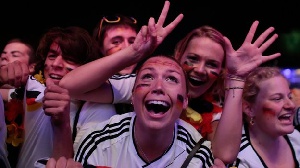The collective sense of shock, embarrassment and national humiliation across Brazil was impossible to ignore and, to be fair, few people here tried to hide it.
There was no attempt to justify, to make excuses or to create scapegoats. Brazil were routed at one thing that they're best in the world at, or at least used to be.
Fans who had paid upwards of $300 (£175) for their tickets were streaming out of the ground in Belo Horizonte at half-time - by which the Germans were already way out of sight with a commanding 5-0 lead.
At fan fests and street parties in Rio and Sao Paulo they abandoned the colourfully decorated stalls and sought solace in bars - still perhaps with one eye on the television set and the growing humiliation in the Mineirao stadium but no longer urging their side on or hoping for a miracle.
In 1950, Brazil lost the deciding World Cup match in Rio de Janeiro's Maracana stadium to Uruguay. Brazil had been expected to win, and the defeat went down in folklore as the "Maracanazo". They still talk about it more than 60 years later… or at least they did until the last game.
At last the (Uruguayan) ghost of 1950 can be laid to rest, sadly to be superseded by a much more potent and humiliating German spectre - the "Mineirazo".
Some people I talked to outside a popular street party in Rio seemed shell-shocked (or the footballing version thereof). No longer really interested in the football, they stayed put but saying very little to each other, sipping very slowly from their Fifa-sponsored beer cups.
"It's only a game of football!" I hear my wife say. She is, of course, right, and there are much more important things in life - especially here in Brazil.
Yet in a deeply divided, unequal and incredibly diverse nation of 200 million people, "futebol" is the one thing that genuinely unites all Brazilians.
Eleven blokes, of mixed race and from different parts of the country can make everyone else feel part of the same family... for as long as they play well.
Dealing with defeat
When reality strikes and the powerful German machine reminds everyone that this Brazilian team is not the star studded line-up of 1970 or 1982, that illusion of togetherness is shattered.
Already some are starting to complain, again, about a tournament that had cost billions of dollars and has not benefited the nation.
Late infrastructure projects and excessive public spending were all arguments we had heard repeatedly before the opening ceremony, but which had largely fallen silent during the tournament.
Will those voices now speak loudly again? Perhaps, it's too early to tell.
Many things about the World Cup have been a resounding success, in particular the quality of the football and some of the organisation - at stadiums, fan fests and airports.
Tonight, many Brazilians were dealing with defeat in the way they know best - playing music, drinking and staying out on the streets.
Others have taken it to heart. Football and the Selecao really do mean that much to them.
They're hurt and humiliated. To be fair the writing had been on the wall, it's just that no-one had expected this World Cup campaign, on home soil, to be extinguished in such a brutal manner.
Sports News of Wednesday, 9 July 2014
Source: bbc.com

















